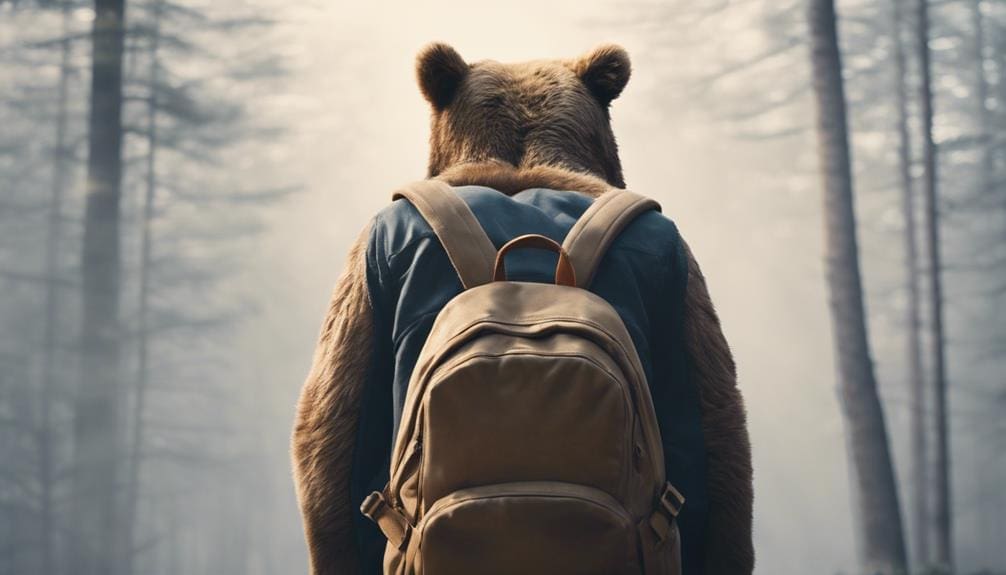Understanding bear safety backpacking fundamentals is crucial if you ever encounter a bear while trekking in the wilderness. Staying composed is key.
However, the actions you take in that critical moment can determine the outcome of the encounter.
Being prepared with knowledge and knowing how to react appropriately can make a significant difference in ensuring your safety and the bear’s well-being.
Remember, your response matters, and understanding bear behavior is vital in these situations.
Key Takeaways:
- Remain calm and back away slowly while facing the bear
- Use bear spray as a deterrent with proper technique
- Differentiate responses based on bear behavior
- Prevent encounters by being alert, making noise, and storing food properly
Immediate Actions to Take
When encountering a bear while backpacking, it’s important to remain calm and avoid making sudden movements to prevent startling the bear. Slowly back away while facing the bear, maintaining eye contact to show you aren’t a threat. Make yourself appear larger by raising your arms or an item above your head. This action can help deter the bear from approaching further.
Remember, don’t run, as this may trigger a chase response from the bear. If the bear charges towards you, stand your ground. Use bear spray if necessary to deter the bear and create a barrier between you and the bear. It’s critical to stay calm in such situations and avoid any sudden movements that could escalate the encounter.
How to React When Spotted
Upon spotting a bear while backpacking, maintaining a calm demeanor and avoiding sudden movements are important for ensuring a safe encounter. Remember, the bear is likely just as startled as you are, and your actions can influence the outcome of the encounter.
Slowly back away while facing the bear to demonstrate that you aren’t a threat. Resist the urge to run or turn your back, as this may trigger the bear’s instinct to chase. Instead, speak calmly and raise your arms to make yourself appear larger.
Keeping a vital distance is important, so allow the bear space to move away if possible. By showing respect and understanding towards the bear’s natural behavior, you can help de-escalate the situation and minimize the risk of conflict.
Stay alert and focused, maintaining a balance between caution and respect for these powerful animals while enjoying your backpacking adventure.
Using Bear Deterrents Effectively
Bear spray stands out as the most effective deterrent against aggressive bears, boasting a success rate of over 90% in deterring bear attacks. When using bear spray, remember to aim and spray in short bursts at the bear’s face when it is within 30 feet to create a deterrent cloud. Make sure to carry EPA-approved bear spray with a minimum of 7.9 ounces of spray content for effective defense. Practice using bear spray before an encounter to be familiar with its operation and effectiveness in deterring bears. Keep the bear spray easily accessible on your backpack or belt for quick deployment in case of a bear encounter.
| Bear Deterrent Tips | Description |
|---|---|
| Aim and Spray | Aim at the bear’s face within 30 feet and spray in short bursts |
| EPA-Approved Spray | Ensure the bear spray is EPA-approved with at least 7.9 ounces of content |
| Practice Before Encounters | Familiarize yourself with using bear spray before an actual bear encounter |
| Keep It Accessible | Have the bear spray easily reachable on your backpack or belt |
Dealing With Different Bear Behaviors
To effectively navigate encounters with bears while backpacking, understanding and responding appropriately to different bear behaviors is essential for ensuring safety in the wilderness.
If a bear ignores you, calmly back away and give it space to avoid confrontation.
When a bear stands on its hind legs or approaches curiously, it’s likely just evaluating its surroundings and not being aggressive.
In the case of a bluff charge, where the bear charges but stops short, stand your ground, make noise, and slowly back away.
A defensive bear will exhibit behaviors like huffing, jaw popping, and swatting the ground; in this situation, back away slowly without making direct eye contact.
However, if faced with a predatory bear attack where the bear is stalking and showing intent to harm, it’s critical to fight back aggressively using any means necessary.
Preventing Future Bear Encounters
When venturing into bear country, taking proactive measures to prevent future bear encounters is paramount for your safety and the well-being of these wild animals.
To minimize the risk of bear encounters while backpacking, there are several key steps you can take. To start, make sure to travel in groups and stay together. Bears are less likely to approach larger, noisier groups, so making noise while hiking can alert them to your presence and prevent surprise encounters.
Additionally, keep your food stored securely and away from your campsite to avoid attracting bears with the scent of food.
Being aware of your surroundings and looking for signs of bear activity, such as tracks, scat, or overturned rocks, can help you avoid areas where bears may be present. It’s also important to carry bear spray and know how to use it effectively in case of a bear encounter.
Frequently Asked Questions
What to Do if You See a Bear While Backpacking?
If you see a bear while backpacking, staying calm is key. Slowly back away, facing the bear. Avoid running or turning your back. Make yourself bigger and speak firmly if the bear approaches. Safety first in wilderness encounters.
How Do You Scare a Bear Away When Hiking?
When hiking, scare a bear away by making loud noises, using bear bells, hiking in a group, clapping hands, waving arms, and shining a flashlight. If needed, back away, stand tall, throw rocks, and stay calm.
What to Do if Bear Approaches Tent?
If a bear approaches your tent, stay calm, slowly back away, and avoid direct eye contact. Make yourself appear larger by extending your arms. Use bear spray if needed. Remember, bear safety and tent safety are key in wildlife encounters.
Should I Bring Bear Spray Backpacking?
Yes, you should bring bear spray backpacking. Bear spray is effective in deterring bear attacks, providing a sense of security. Keep it easily accessible on your backpack for quick deployment. Prioritize safety by familiarizing yourself with bear spray use beforehand.
Conclusion
To sum up, encountering a bear while backpacking can be a scary experience, but knowing how to react can make a big difference.
Stay calm, make noise, and use bear deterrents like pepper spray when needed.
Remember to never run from a bear and always report any incidents to park rangers.
By following these safety guidelines and being prepared, you can help prevent bear encounters and guarantee a safer wilderness experience.














